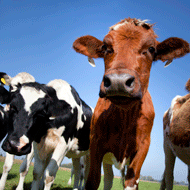
Changes come into effect on 1 May
Farmers are still concerned about the possible impact of changes to the bTB testing system, according to the National Farmers Union (NFU).
At present, on-farm bTB testing in England is carried out by vets working for private businesses who are trained, appointed and paid by the Animal and Plant Health Agency (APHA).
From 1 May, 2015 APHA will manage bTB testing in England through delivery partners who have successfully tendered for the work and who will be responsible for allocating and monitoring testing in five geographical regions in England.
NFU's deputy president, Minette Batters, said: “It is vital that the changes are introduced as smoothly as possible with the minimum of impact on farmers. Throughout this process we have made our concerns very clear to Defra and the APHA and farmers remain concerned about how the changes will impact on their ability to continue to use their own vet."
Some vet practices have decided to opt-out of providing testing services because the new payment structure and extra administration has made testing uneconomic.
"This will inevitably mean some farmers will no longer be able to use their existing vet, which will undoubtedly be a concern for them," Minette adds.
However the NFU stress that the delivery partner responsible for each region has an obligation to provide testing services at no cost to the farmer. Therefore any farmers in this position will be contacted with alternative veterinary practices.
The NFU are also concerned that testing on smaller farms, or farms which have more complicated tests, will no longer be economically viable for local veterinary practices under the new regime.
"It is important that if the introduction of the new system leads to problems which result in overdue tests, farmers are not fined under cross compliance for something that is beyond their control," said Minette. "It is also important that farmers ensure they have safe and efficient testing facilities available to ensure testing can be carried out in an effective and timely manner.
“Communication is the key to ensuring this new system is introduced with the minimum of problems and it is vital that APHA makes sure it communicates regularly and clearly with farmers so they are fully aware of what is happening, why it is happening and what it will mean for them and their businesses.
"There needs to be a consistent approach across the whole country to ensure the process runs as smoothly and straightforwardly as possible, and this hasn’t been the case so far.”
To find out more about the changes and what they mean for farmers, visit www.gov.uk.



 FIVP has shared a survey, inviting those working in independent practice to share their views on the CMA's proposed remedies.
FIVP has shared a survey, inviting those working in independent practice to share their views on the CMA's proposed remedies.